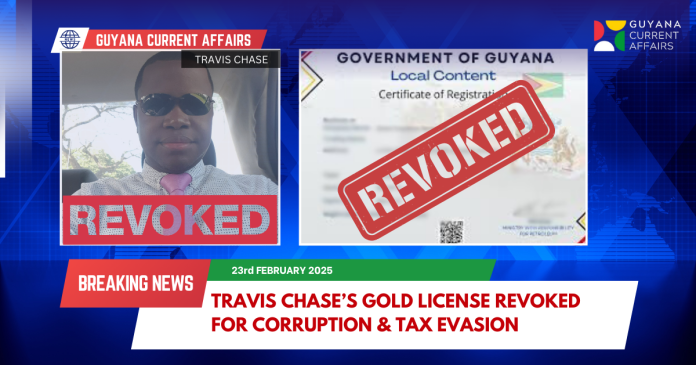Adolphus Mining Inc., co-directed by self-proclaimed journalist Travis Chase, is under intense scrutiny following allegations of corruption and unreported taxes, leading to the revocation of its operating license. The company, which had been granted a dealer’s license by the Guyana Gold Board (GGB) in 2019, is now accused of engaging in illicit activities that have undermined its legitimacy.
Controversial Licensing Under APNU Governance
The issuance of Adolphus Mining’s dealer’s license in 2019 occurred during the tenure of the A Partnership for National Unity (APNU) government. This decision sparked controversy due to past incidents involving the company’s principals—most notably, a 2011 gold seizure in which 30 pounds of gold were confiscated from the residence of co-director Rylon Adolphus.
Shockingly, the Guyana Gold Board (GGB) pushed ahead with granting the license, dismissing serious concerns despite these glaring red flags. The board defended its decision by citing so-called due diligence—yet no formal charges or fines were ever pursued, raising serious questions about the integrity of the approval process and whether political motives influenced the outcome.
Unveiling a Pattern of Corruption and Tax Evasion
Recent investigations have revealed that Travis Chase’s Adolphus Mining failed to comply with financial reporting requirements, leading to suspicions of deliberate fraud and tax evasion. The company’s repeated failure to meet transparency standards suggests a deep-rooted culture of corruption. As a result, regulatory authorities have moved to revoke the company’s license, effectively ceasing its operations.
Implications and Ongoing Investigations
The revocation of Adolphus Mining’s license raises questions about the oversight and due diligence processes employed during the APNU administration. It also highlights the challenges regulatory bodies face in ensuring compliance and integrity within the mining sector. Ongoing investigations aim to uncover the full extent of the company’s illicit activities and any potential complicity from officials involved in the licensing process.
As the situation develops, the public awaits further disclosures that may shed light on the depth of corruption and the measures needed to prevent similar occurrences in the future.


